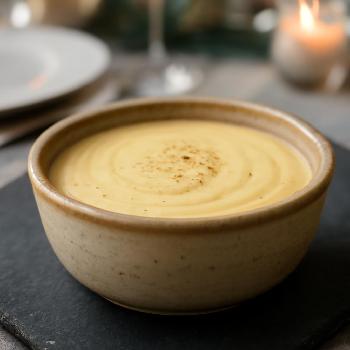Cooking Tips > Ingredients & Substitutes > Ingredient Clarifications > What is a bain-marie?
What is a bain-marie?

Understanding the Bain-Marie Principle
Setting up a Bain-Marie
Oven Bain-Marie: Place the dish containing the food (e.g., a ramekin for crème brûlée or a springform pan for cheesecake) inside a larger baking pan. Carefully pour hot water into the larger pan, reaching about halfway up the sides of the dish containing the food. Be careful not to splash water into the dish.
Stovetop Bain-Marie: Use a double boiler, which consists of two nested pans. The bottom pan holds the water, and the top pan holds the food. If you don't have a double boiler, you can use a heatproof bowl set over a saucepan of simmering water, ensuring the bottom of the bowl doesn't touch the water.
For both methods, it's important to monitor the water level during cooking and add more hot water as needed to maintain a consistent temperature.
Common Uses for a Bain-Marie
Custards and Creams: Crème brûlée, flan, and custards benefit from the gentle heat of a bain-marie, which prevents curdling and ensures a smooth, creamy texture.
Cheesecakes: Baking cheesecakes in a bain-marie helps prevent cracking and creates a moist, even texture.
Melting Chocolate: A bain-marie provides a controlled environment for melting chocolate without scorching it.
Hollandaise Sauce: The gentle heat of a bain-marie helps emulsify the sauce and prevents the eggs from scrambling.
Tempering Chocolate: Bain-maries are often used to help temper chocolate giving it a smooth and shiny finish.
Keeping Food Warm: Bain-maries can also be used to keep sauces and other dishes warm without drying them out.
Tips for Success
Use hot water: Start with hot water to speed up the cooking process.
Monitor the water level: Check the water level periodically and add more hot water as needed.
Avoid boiling water: Boiling water can create steam and cause uneven cooking. Simmering water is ideal.
Use a thermometer: For precise temperature control, use a thermometer to monitor the water temperature.
Be careful when removing the dish: When removing the dish from the bain-marie, use oven mitts and be careful not to spill the hot water.
FAQ
-
Can I use cold water for a bain-marie?
While you can use cold water, it will take longer to heat up and may affect the cooking time. It's generally recommended to use hot water to start. -
What if water gets into my dish while using a bain-marie?
If water gets into your dish, it can affect the texture and flavor. If it's a small amount, you may be able to continue cooking. However, if it's a significant amount, it's best to start over. To prevent this, wrap the outside of your springform pan with foil if baking a cheesecake, or be extremely careful when placing the dish in and out of the water bath. -
Can I use a bain-marie on the grill?
Yes, you can use a bain-marie on the grill, especially for indirect cooking. Place the water bath on one side of the grill and the food on the other, ensuring the heat is distributed evenly. Make sure your grill is stable enough to hold the water-filled pan. -
What temperature should the water be in a bain-marie?
The ideal water temperature for a bain-marie is usually between 170°F (77°C) and 212°F (100°C). You want it to be simmering gently, not boiling vigorously, to ensure even and gentle cooking.
